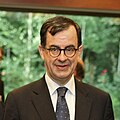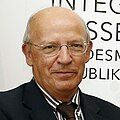| Office | Minister | Party | Start of term | End of term |
|---|
| Prime Minister |  | António Guterres | | PS | 25 October 1999 | 6 April 2002 |
| Minister(s) of State |  | Jaime Gama | | PS | 25 October 1999 | 25 October 2002 |
| Jorge Coelho | | PS | 10 September 2000 | 10 March 2001 |
| Minister of Foreign Affairs |  | Jaime Gama | | PS | 25 October 1999 | 6 April 2002 |
| Minister of Presidency | Jorge Coelho | | PS | 25 October 1999 | 14 September 2000 |
 | Guilherme d'Oliveira Martins | | Independent | 14 September 2000 | 6 April 2002 |
| Minister of Social Infrastructure | Jorge Coelho |
| PS | 25 October 1999 | 10 March 2001 |
 | Eduardo Ferro Rodrigues |
| PS | 10 March 2001 | 23 January 2002 |
 | José Sócrates |
| PS | 23 January 2002 | 6 April 2002 |
| Minister of National Defense |  | Júlio Castro Caldas | | Independent | 25 October 1999 | 3 July 2001 |
| Rui Pena | | Independent | 3 July 2001 | 6 April 2002 |
| Deputy Minister | Fernando Gomes | | PS | 25 October 1999 | 14 September 2000 |
| Minister of Internal Administration | Fernando Gomes | | PS | 25 October 1999 | 14 September 2000 |
 | Nuno Severiano Teixeira | | Independent | 14 September 2000 | 6 April 2002 |
| Minister of Finance |  | Joaquim Pina Moura | | Independent | 25 October 1999 | 3 July 2001 |
 | Guilherme d'Oliveira Martins | | Independent | 3 July 2001 | 6 April 2002 |
| Minister of Economy |  | Joaquim Pina Moura | | Independent | 25 October 1999 | 14 September 2000 |
| Mário Cristina de Sousa | | Independent | 14 September 2000 | 3 July 2001 |
| Luís Braga da Cruz | | PS | 3 July 2001 | 6 April 2002 |
| Minister of Labour and Solidarity |  | Eduardo Ferro Rodrigues | | PS | 25 October 1999 | 10 March 2001 |
| Paulo Pedroso | | PS | 10 March 2001 | 6 April 2002 |
| Minister of Justice |  | António Costa | | PS | 25 October 1999 | 6 April 2002 |
| Minister of Planning |  | Elisa Ferreira | | Independent | 25 October 1999 | 6 April 2002 |
| Minister of Agriculture, Rural Development and Fisheries |  | Luís Capoulas Santos | | PS | 25 October 1999 | 6 April 2002 |
| Minister of Education |  | Guilherme d'Oliveira Martins | | Independent | 25 October 1999 | 14 September 2000 |
 | Augusto Santos Silva | | PS | 14 September 2000 | 3 July 2001 |
| Júlio Pedrosa | | Independent | 3 July 2001 | 6 April 2002 |
| Minister of Health | Manuela Arcanjo | | PS | 25 October 1999 | 3 July 2001 |
| António Correia de Campos | | PS | 3 July 2001 | 6 April 2002 |
| Minister of the Environment and Territorial Planning |  | José Sócrates | | PS | 25 October 1999 | 6 April 2002 |
| Minister of Culture | Manuel Maria Carrilho | | PS | 25 October 1999 | 12 July 2000 |
| José Sasportes | | Independent | 12 July 2000 | 3 July 2001 |
 | Augusto Santos Silva | | PS | 3 July 2001 | 6 April 2002 |
| Minister of Science and Technology |  | Mariano Gago | | Independent | 25 October 1999 | 6 April 2002 |
| Minister of State Reform and Public Administration | Alberto Martins | | PS | 25 October 1999 | 6 April 2002 |
| Minister for Equality |  | Maria de Belém Roseira |
| PS | 25 October 1999 | 14 September 2000 |
| Minister of Youth and Sports | Armando Vara | | PS | 14 September 2000 | 18 December 2000 |
 | José Lello | | PS | 18 December 2000 | 6 April 2002 |
| Assistant Minister to the Prime Minister (Ministro Adjunto do Primeiro-Ministro) | Armando Vara | | PS | 25 October 1999 | 14 September 2000 |
 | António José Seguro | | PS | 3 July 2001 | 6 April 2002 |
















